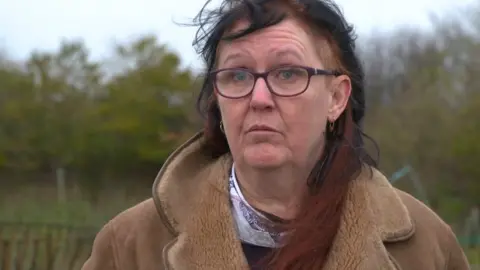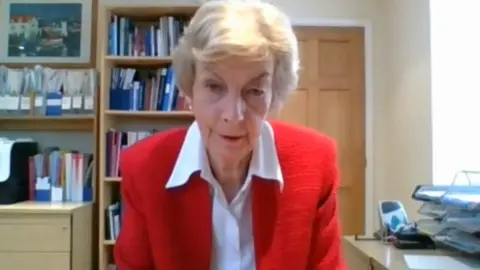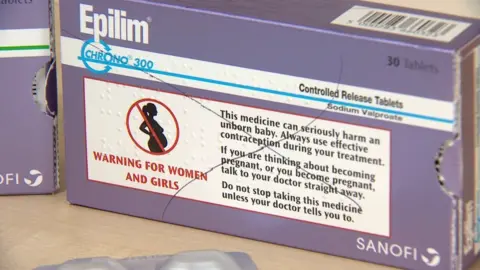'I didn't know epilepsy drug would harm my baby'
 BBC
BBCChristine Coley was prescribed sodium valproate for epilepsy when she was trying for her fourth child but she did not know it risked harming her baby.
Her son Tristram is now 22 and has what is known as Foetal Valproate Spectrum Disorder.
Developmental problems have led to autism and communication difficulties.
"He needs 24-hour-a-day supervision," his mother says. "Tristram can't cross a road by himself."
Christine, who lives near Fraserburgh in Aberdeenshire, said she loved the young man her son had become but felt sad about the challenges he faced.
"I did feel angry when I realised they had known about the problems of the medication when I was prescribed it," she said.

Problems with sodium valproate, commonly known by the brand names Epilim, Episenta and Depakote, were first identified in the 1970s but restrictions were only placed on its use two years ago.
Drug regulator the MHRA said up to four in 10 babies were at risk of developmental disorders if sodium valproate was taken during pregnancy and one in 10 was at risk of birth defects.
All of the 17,000 women of child-bearing age prescribed sodium valproate each year in the UK should be on a pregnancy-prevention programme to ensure they are aware of the risks but campaigners and charities said this was often not the case.
In July this year, Baroness Cumberlege announced the findings of her two-year review into three major long-term medical problems, of which sodium valproate was one.
She said it was not known how many children had been affected by the drug but 20,000 was a "reasonable estimate".

Baroness Cumberlege said babies were still being born today - estimates suggest hundreds a year - who had been exposed to sodium valproate despite the risk being well recognised and undisputed.
She said the system did not know how to ensure every woman of childbearing age on the drug was continuously monitored and advised of the risks.
In her report, she called for the establishment of a database of all women of child-bearing age who were taking the drug, to enable women to be contacted and reminded of the risk.
Baroness Cumberlege told BBC Scotland: "If a woman of childbearing age is pregnant and she takes sodium valproate and the baby is exposed to that in the womb there is a one in two chance that her baby will be disabled.
"That is a scandal, that is appalling, that is something we have got to do something about. Society is letting them down."

What is sodium valproate?

The NHS website says sodium valproate is used to treat epilepsy and bipolar disorder.
It is occasionally used to prevent migraine headaches.
The medicine is only available on prescription. It comes as capsules, tablets and a liquid that you swallow. It also comes as granules that you mix with food or drink.
It is not recommended for girls or women who may become pregnant. The website says your doctor will put you on Prevent, the valproate pregnancy prevention programme.

Falling through the cracks
About 1,000 women of childbearing age in Scotland are still taking the drug.
Epilepsy Scotland said there was a need for a national database because women taking the drug still did not know the risks.
A survey of about 500 women on sodium valproate suggested as many as one in five had no idea that the drug could cause developmental problems in children and almost half had not discussed risk with their clinician in the previous 12 months.
Anissa Tonberg, the charity's public affairs manager, said: "Despite the best efforts of clinicians, women are still falling through the cracks at the moment.
"We need a more systematic way of identifying women in Scotland who are taking sodium valproate and need support and information. We feel that comes from having a good epilepsy register around the country."
Ms Tonberg warned that patients should not stop taking the drug without first consulting their GP.
Patients' advocate
Baroness Cumberlege's review also recommended appointing an independent patient safety commissioner to hold the health system to account and setting up discretionary payment schemes to meet the costs of care for those already affected.
The Westminster government, which commissioned the review, has yet to respond to its recommendations.
The Scottish government, in its programme of government for the coming year, said it was considering the full recommendations of the Cumberlege review.
It said it was committed to creating the role of a national advocate for patients but gave no further details.
Baroness Cumberlege said the patients' advocate must be someone who was outside the system.
She said: "It is really important that they hold the trust of patients and if we feel that they are not independent of the system they will be seen as a patsy."
For families like Christine Coley's the support can't come soon enough.
She said: "It is not just future children that are born to women who are on sodium valproate, it is all the children that have been born and are now growing up and what will happen to them. We need to know they are financially and socially secure for the rest of their lives."
